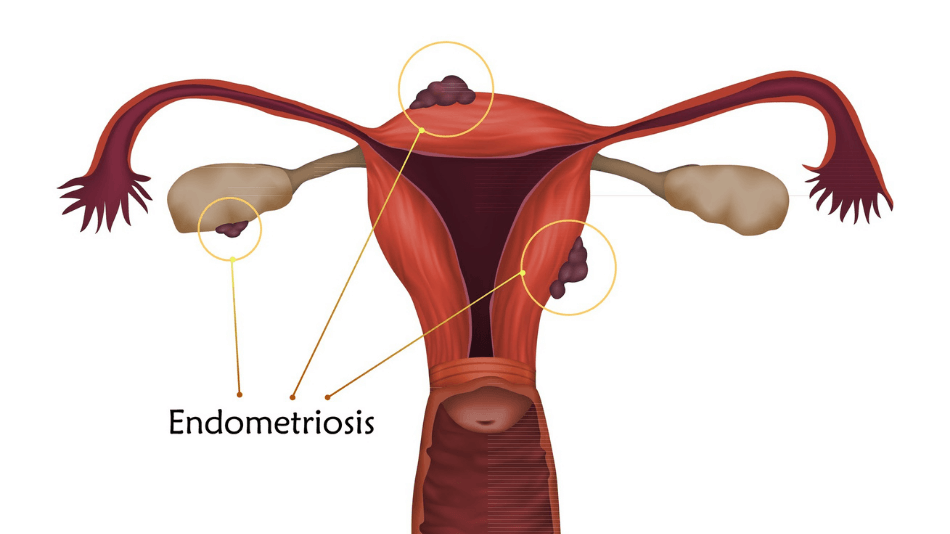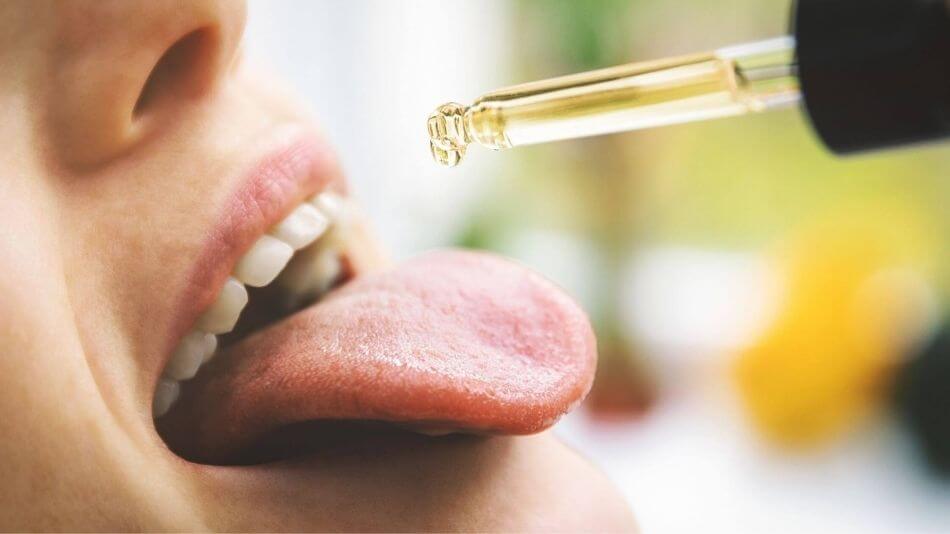Endometriosis, a sometimes debilitatingly painful disorder, affects almost 10% of reproductive-aged women, many of whom are beginning to turn to CBD for help.
CBD can help manage endometriosis pain thanks to its anti-inflammatory, relaxing properties. Symptoms like nausea, cramping, and their resulting stress can also be remedied with CBD, making it a unique, multi-faceted treatment option that’s hard to compete with.
In fact, many women are drawn towards investigating alternative medicines due to the prevalence of adverse side effects within conventional treatment options. The good thing is that CBD, unlike many other “natural” or holistic treatments, actually has some science to back up its abilities and benefits. Here, we’ll explain what CBD is, how endometriosis works, and how using CBD for endometriosis pain has been demonstrated to help ease many of the unpleasant symptoms of the condition.
What is endometriosis?
Endometriosis is a condition in which the lining of the uterus (typically referred to as the endometrium) exists in other places in the body.
This can happen due to the actual tissue itself moving to other parts of the body, often via the fallopian tubes, or due to cells in other areas of the body undergoing a spontaneous process called coelomic metaplasia in which they can become uterine lining.
Endometriosis can be incredibly painful, or for some, it may cause no pain at all.
For some women, the pain is primarily felt during their period, as the misplaced cells will begin to bleed and cause irritation to other organs and cells, causing pain and inflammation. For others, the pain associated with it may be constant, regardless of the timing of their menstrual cycle.
Pain may also worsen with intercourse or during bowel movements. The pain may occur both in the uterus, abdomen, and pelvis, but it can also occur in any part of the body where endometrium has grown.
In addition to pain, endometriosis can come with other symptoms and side effects, including:
- Irregular bleeding, such as heavy bleeding or bleeding between periods
- Painful urination
- Bloating
- Lower back pain, even when not on your period
- Gastrointestinal problems
- Infertility
There are a variety of treatments for endometriosis. Many doctors will commonly direct patients to use typical over-the-counter pain relievers, such as ibuprofen, or may prescribe specific pain relief drugs to ease abdominal pain during the menstrual cycle.
Other medications that are meant to limit or completely inhibit a woman’s natural hormones may often be used to control her menstrual cycle and try to limit pain. More invasive treatment options, like surgery, may also be used in order to limit complications and reduce pain in extreme cases.

What is CBD?
Cannabidiol (CBD) is a compound called a cannabinoid that is found in plants in the cannabis family, i.e. hemp or marijuana.
Unlike THC, the other main compound found in cannabis, CBD is a non-psychoactive compound, meaning it cannot get you high. CBD can be consumed in a variety of forms, but regardless of method of intake, its use is associated with a feeling of calm, pain relief, and a pleasant mood boost.
For the most part, the sale of CBD is legal across the United States, though in some states its production may be more or less restricted.
The benefits of CBD are often thought to be a result of the way that it, and other compounds found in cannabis, interact with a part of the nervous system called the endocannabinoid system (ECS).
This system affects sleep, mood, memory, appetite, and a variety of other functions in the body, and when cannabinoids bind to parts of the ECS they can have beneficial impacts in these areas.
The therapeutic potential for cannabinoids has not been studied extensively due to restrictions on THC and CBD in the past, but while the body of research is still relatively young, there seems to be great promise.
While federally legal hemp grown in the United States is meant to contain less than 0.3% THC, and while many CBD users may opt for a THC-free option for their intake, using CBD alongside THC and other cannabinoids can offer a wider range of positive effects due to a phenomenon called the Entourage Effect.
Will CBD Help With Endometriosis?
CBD, based on both anecdotal and research-based evidence, can indeed be a useful treatment tool for endometriosis. Before really anything else about the compound, CBD’s ability to function as an effective pain-reliever is incredibly well documented.
Not only thought to be anti-inflammatory, many studies have demonstrated CBD’s incredible effectiveness as an analgesic since the dawn of medical studies revolving around the compound.
That is to say that even without very specific studies revolving around CBD’s effect on endometriosis, it would be a pretty educated guess to say that it is helpful with pain relief.
However, in addition to reducing inflammation and blocking pain receptors, CBD may provide other benefits to sufferers of endometriosis.
Current Research on CBD and Endometriosis
The endocannabinoid system actually plays a large role in regulating the migration of endometrial cells in all uteruses — this migration, which is normal during an individual’s period, can be very problematic for those suffering from endometriosis.
Some evidence suggests that CBD inhibits the movement of these cells, which could potentially have a great deal of promise for treating endometriosis and reducing the rate of new lesion growth.
Additionally, in some endometriosis-specific animal studies, cannabinoids have been demonstrated to significantly reduce the rate of growth for endometrial tissue.
CBD has also been used as a treatment for nausea, which may be helpful for women who suffer from gastrointestinal distress as a result of endometriosis. CBD has been prominently used in trials with chemotherapy patients in order to limit nausea, vomiting, and to improve appetite, with a great amount of success.
While depression and anxiety may not directly be caused by endometriosis, it is often linked to it in many women who suffer from the condition.
The difficulty of managing chronic pain, in addition to the sometimes detrimental effect it can have in an individual’s sex life and prospects of childbirth, can more than certainly cause patients a great deal of stress and dismay.
CBD may be able to help with that too, as loose links have been made to CBD as a surprisingly promising treatment for anxiety.
To summarize, it seems that the research available to us thus far suggests that, even if CBD doesn’t directly impact endometriosis (which it likely can), it does consistently treat the symptoms associated with the condition.
That means it can act as a sort of medication; in fact, further inquiry into how the endocannabinoid system and cannabinoids work with endometriosis reveals that CBD may be uniquely suited to treating this specific type of condition.

The Endocannabinoid System and Endometriosis
The endocannabinoid system plays a significant role in the development of endometriosis and also influences pain signals related to the condition. As discussed above, regulating the migration of endometrial cells is a key part of ensuring the condition doesn’t develop – when the endocannabinoid system doesn’t complete this task as intended, it can contribute to endometriosis symptoms.
The endocannabinoid system is a complex network that extends throughout the whole body. It can influence the central nervous system, immune system, digestive tract, and more, and it’s present in all humans (even those who never use cannabis products).
You can think of this system as a sort of transportation network that delivers important messages to different parts of the body. Different cannabinoids (found in cannabis plants) and endocannabinoids (created naturally inside the body) interact with receptors throughout the system, bind to them, and kickstart bodily responses.
Because the endocannabinoid system has been revealed to be an important part of endometriosis, it’s a main target for therapeutic treatment and potentially even reversing the effects of the condition.
Developing medications – especially those that use CBD and other cannabinoids – to work with this system, therefore, is the first step toward targeted, beneficial treatment plans.
Cannabinoids like CBD are perhaps the best and most obvious options we can utilize to achieve this goal, so it’s likely we’ll see a significant increase in the amount of cannabinoid-based treatments available for conditions of all sorts.
Best Way to Take CBD for Endometriosis
In general, the most beneficial way to use CBD for endometriosis is to consume a high-strength, long-lasting product on a daily basis (or multiple times throughout the day, if necessary).
Product types that fit this description include tinctures, gummies or edibles, and CBD oil, among others. Though smokable options like hemp flower are also available, their effects may wear off faster and be hard to maintain all day.
CBD is not habit-forming, so it’s safe to use it as often as you need to for pain relief. Be sure to check with your doctor before implementing CBD into your routine, especially if you take prescription medications (which can lessen the efficacy of CBD or vice versa).
How much CBD is needed for endometriosis?
An appropriate dosage for endometriosis may range from 30 or 40 mg of CBD all the way up to 300-400 mg or more; it really depends on the severity of an individual’s system and their own unique response to CBD.
Dosages can be influenced by a person’s size, eating or drinking habits, and the type of product being used. Be sure to check out your product’s packaging – it’s likely that a dosage guide or recommendation is provided.
If you’re new to CBD, it’s best to start out with lower doses – between 20 to 50 mg of CBD – to see how it impacts you. Once you’ve determined you won’t experience any side effects, you can begin to increase your dose until you find one that manages pain the way you need it to.
How long does it take for CBD oil to work for pain relief?
Because CBD oil is absorbed into the body through the stomach, it can take a bit longer than other products to kick in; you can expect results in about 30 to 60 minutes after consumption.
If you use your CBD oil sublingually (under the tongue), you may experience results within just a few minutes.
Conclusion
As with any supplement, be sure to consult your doctor before beginning regular use of CBD.
While CBD is incredibly safe and well-tolerated on the whole, it’s important to speak with a professional who understands how CBD might interact with your body or potential medications you may take; CBD has a wide variety of generally mild but potentially concerning drug interactions that are worth being informed about, including NSAIDs.
Additionally, it is important to source your CBD from a reputable seller. CBD Facilitator offers a directory of high-quality CBD products in a variety of forms from health-focused, trust-worthy vendors all over the country.
Though there is no cure yet for endometriosis, many women across the globe use CBD and other forms of Cannabis to manage their symptoms with few-to-no side effects with a decent amount of success.
Additionally, the young-but-emerging body of research concerning CBD’s effect on endometriosis seems to be incredibly promising — with CBD, endometriosis patients may see a greatly improved quality of life.
While every woman’s body is different, and every case of endometriosis may be somewhat distinct, it may be worth giving the compound a try if prescribed courses of medication haven’t garnered the greatest results.










